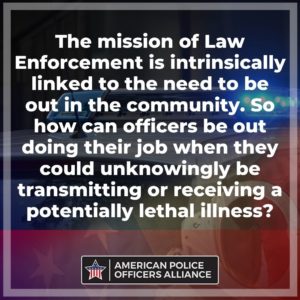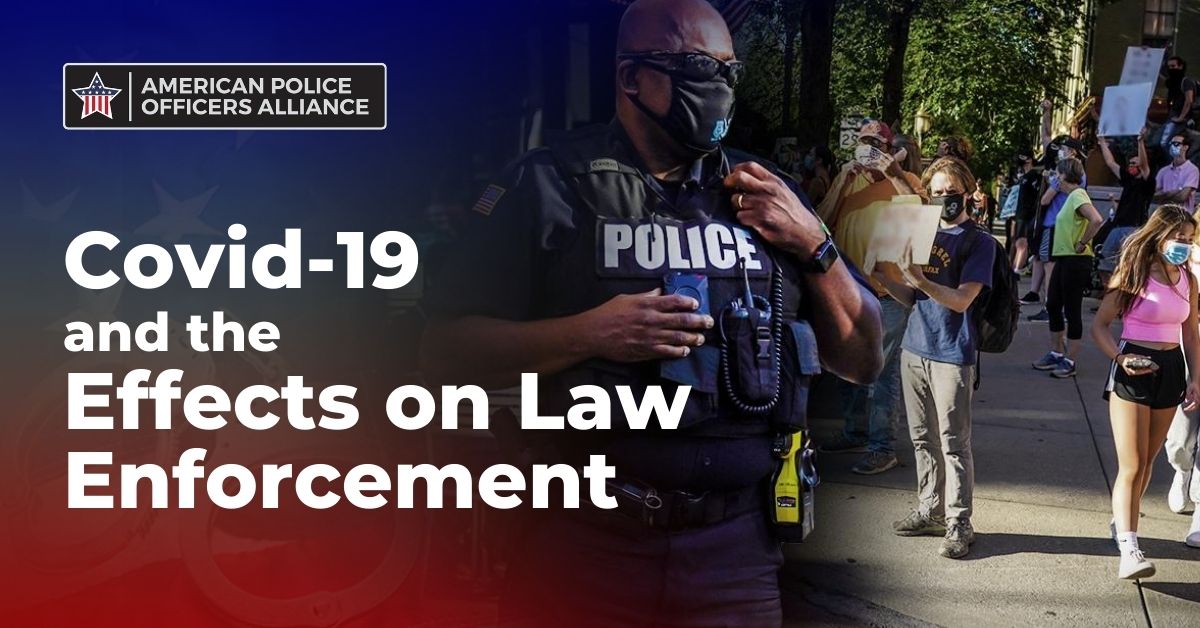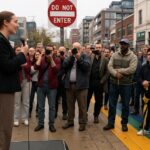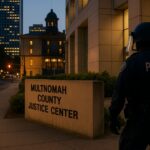In many ways, the year 2020 has felt like the social equivalent of opening Pandora’s box. Most fundamental to the instability and disorder in our society is the emergence of the Covid-19 pandemic virus. The unknown nature of many of the virus’ core behaviors such as lethality, transmission, and half-life, has left many communities around the country scrambling for ways to safeguard their citizens and join in the fight to combat the effects, both individual and societal, of the virus.
While there are many countless and thankless jobs across our country that have required thousands of selfless individuals to continue serving their communities in various functions, no single profession has found itself more entangled in the web of Covid-19 and subsequent social fallout than the members of law enforcement.
Social Distancing and Law Enforcement
First, it is unavoidable to acknowledge that Covid-19 as a medical phenomenon poses many potential risks to our officers and other first responders. The mission of Law Enforcement is intrinsically linked to the need to be out in the community. So how can officers be out doing their job when they could unknowingly be transmitting or receiving a potentially lethal illness?

In the “Covid Response Manual,” The International Association of Chiefs of Police outlines the new normal for how law enforcement ought to be managed in America. The most obvious changes to how policing is done centers on bringing the concept of “social distancing” to policing practice as much as possible. This means anything from the thorough sanitation of vehicles, to opting not to directly handle citizen’s identification when conducting routine stops or other basic interactions with the public. It has also resulted in a new method in managing criminal complaints from the public. A new emphasis has been placed on responding to events such as burglary, rape, murder, domestic assault, etc., and reducing activity in “pro-active enforcement.” Add in the personal health risks to individual officers balanced against the need to respond to members of the community who may be infected, police now have the responsibility of being law enforcement officers and pseudo healthcare professionals required to recognize the illness and respond accordingly.
Protests and Crowd Management
2020 has had its fair share of rioting and protesting, and it’s been handled very differently this year than years passed. Some of which may be due to Covid-19. Dealing with crowds now has an increased health risk as officers are forced to be in contact with thousands of potential transmitters.
These movements have also led to a Defund Police movement which is creating further budgetary constraints that already has many departments across the country on the ropes with police and equipment shortages. Also, the increased riots and protests, along with the loss of funds, may directly reduce the capabilities of police forces to address domestic disturbances and smaller non-violent crimes in the community.
Supplies and Personal Protective Equipment
Lastly, let’s consider the burden of budgetary cuts against the clear need for more and better trained officers amidst the rising cost of PPE (Personal Protective Equipment) that departments will be forced to continue supplying as long as the current state of the virus remains. The CDC mandates that officers are provided a list of PPE when interacting with the public, such as disposable gloves, gowns, respirators or facemasks, and eye protection in the form of goggles or disposable face shields.
It is unclear how long we will all have to live with the virus. We do know that many in society are at their breaking point and its showing on the nightly news. Unfortunately, law enforcement and police officers are on the front lines dealing with all of this chaos. Even worse, they’re having to do it while also being short staffed and being scrutinized for every action and word.
We’re not sure what’s ahead, but we do know that police and law enforcement need our support more than ever. They’re the last line of defense against complete chaos.
It’s an undeniable fact that the novel coronavirus or COVID-19 pandemic has wreaked havoc on virtually every sector in every country in the world. Let’s examine a few ways in which the coronavirus is affecting law enforcement, and what organizations have stepped up to provide help. Read more here.










